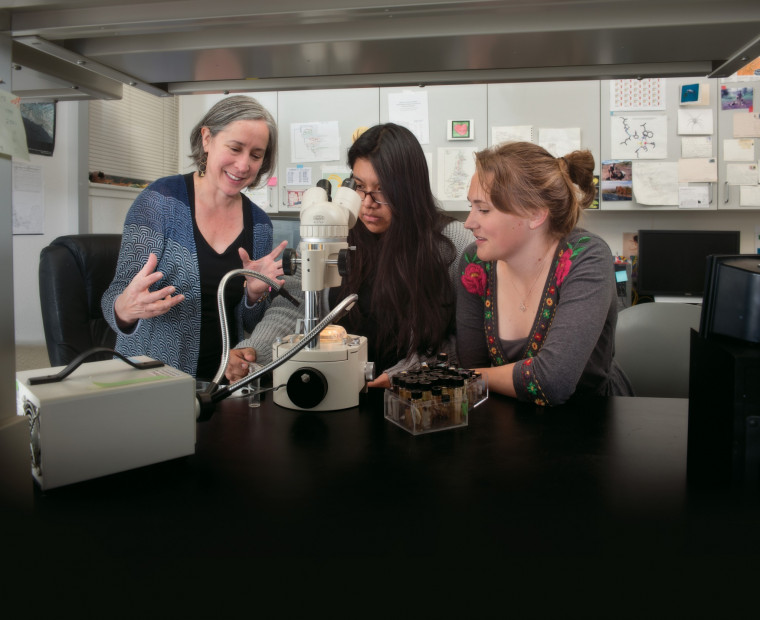Changes to Biology Curriculum
Open gallery

The Biology department is delighted to announce three new introductory courses for the major, which will replace Biology 141, 151, and 200 beginning in the 2019-2020 academic year:
- BIO 110: Biological Investigations will be a 4-credit, hands-on introduction to scientific investigation through project-based lab or field studies of biological phenomena. The specific focus of individual Bio 110 sections will vary with faculty expertise, which you can learn more about here. In Fall 2019, sections will be taught by Dr. Bierzychedek (Ecology) and Dr. Velazquez (Behavioral Genetics).
- BIO 201: Biological Core Concepts - Systems will be a 4-credit, lecture-based introduction to core principles that underlie all of biology, illustrated through evidence-driven examples centered on integrative organismal biology and organisms’ interactions with the biotic and physical environment.
- BIO 202: Biological Core Concepts - Mechanisms will be a 4-credit, lecture-based introduction to core principles that underlie all of biology, illustrated through evidence-driven examples centered on interactions among molecules and cells within organisms.
We are very excited about these new courses, which reflect our department’s philosophy that the best way to learn science is to do science. In particular, we believe these classes will improve the student experience:
- These courses retain the successful components of BIO 141, 151, and 200, especially the opportunity to experience the process of science and to determine whether this kind of rigorous intellectual activity stimulates student interest and imagination.
- Sections will be much smaller than in our current offerings of BIO 141, 151, and 200, creating more opportunity for interaction, active learning, and pedagogical innovation.
- Faculty will choose to focus each section on topics central to their expertise and intellectual passion. While specific examples will differ among sections taught by different faculty, each course will illustrate and underscore how certain core concepts are fundamental to all subdisciplines within biology.
- Each course will develop the skills that are crucial to the next generation of biologists, including quantitative literacy and understanding and communicating the links between society and biology and related disciplines.
- Each of these courses will be taught every semester, providing more flexibility for students.
- These changes put us on the cutting edge of national trends in undergraduate biology education.
If you are a student considering the Biology major or any other curricular path that passes through the Biology department, please read on to understand what these changes mean for you. Please also speak to any member of the Biology department if you have questions, and keep your eyes out for an information session we will host during the first week of March.
Getting Started
If you have not yet taken any of the introductory biology classes, but are interested in the biology major, please enroll in BIO 110, which has a QR 101 prerequisite. If you do not yet meet the QR 101 prerequisite, please read more about the ALEKs placement exam (here) and speak to your advisor.
If you have already earned credit for an introductory biology course, please read our suggestions on your continued path through the Biology curriculum. You may skip directly to information for the relevant group by following these links:
- Current or intended Biology majors
- Current or intended BCMB majors
- Current or intended ENVS majors or minors
- Current or intended Neuroscience minors
- Pre-health interest, in any non-Biology major
- Interest in fulfilling the Natural Sciences or SQR-A general education requirement
Biology is located in room 210 of Biology-Psychology on the Undergraduate Campus.
MSC: 53
email biology@lclark.edu
voice 503-768-7511
Chair Tamily Weissman-Unni
Biology
Lewis & Clark
615 S. Palatine Hill Road MSC 53
Portland OR 97219

